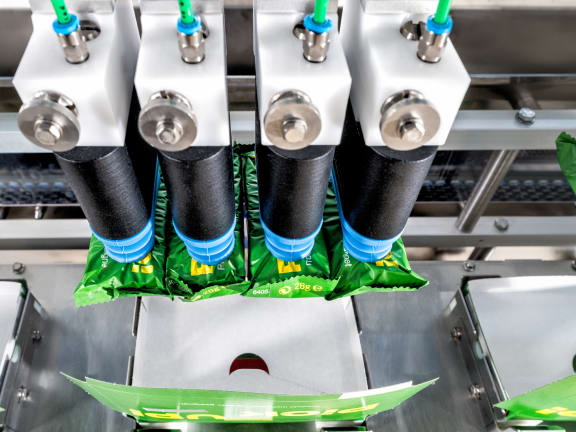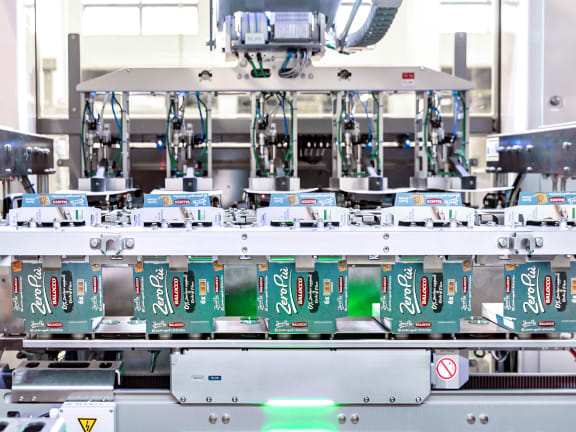Do you value environmental protection and are looking for sustainable packaging for your bakery products? With Schubert Packaging Perspectives, you’ve come to the right place.
The demands made on packaging are becoming increasingly stringent. It needs to preserve baked goods, protect them from damage and ensure that they are attractive on the shelf. Additionally, the demand for sustainability is growing – from both consumers and legislators. As part of our Packaging Perspectives service, we develop solutions that bring together functionality, cost-effectiveness and sustainability. Let our experts advise you on how you can design your baked goods packaging sustainably.
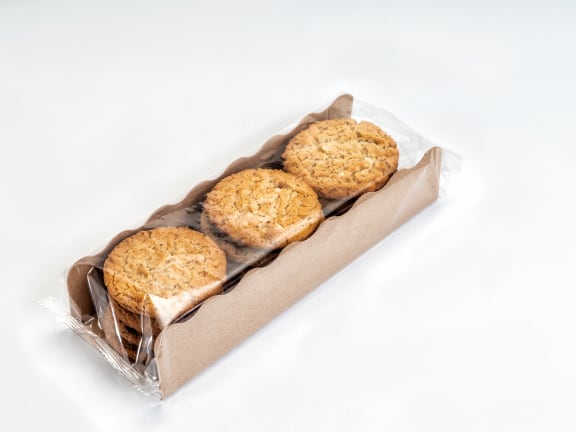
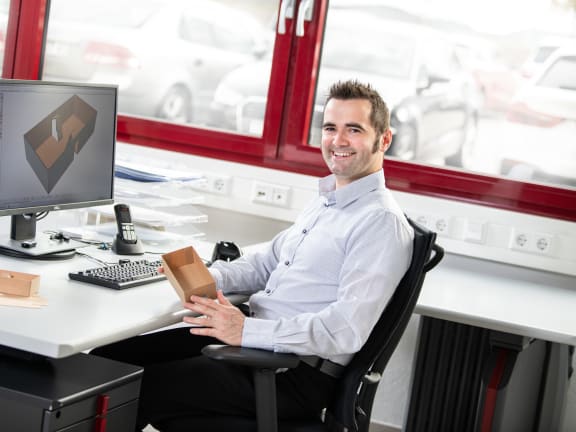

Packaging materials for bakery products
More environmentally friendly packaging materials such as paper, cardboard, monofilms or hybrid materials with a lower plastic content are decisive when it comes to sustainability. However, it is important that your sustainable packaging for baked goods is also suitable for automation and can be processed by the packaging machine. Our packaging systems process conventional and environmentally friendly materials with equal security and efficiency, providing you with a choice.

A sustainable solution: Cardboard packaging for bakery products
When you think of sustainable packaging solutions for baked goods, do you think of cardboard? Then you’re right. On the one hand, cardboard is made from wood, a renewable raw material. And on the other, it can be easily returned to the recycling cycle. This is also demonstrated by the high recycling rates throughout the EU. Schubert has decades of experience with cardboard as a packaging material and has gained a great deal of expertise in this area. Our cartoners and casepackers pack your sensitive baked goods carefully, efficiently and compactly. And they cover a wide range of cardboard packaging: from various types of boxes to shipping crates or shelf-ready packaging solutions directly for the sales shelf. We will not only supply you with standard packaging for your baked goods, we will also be delighted to accommodate your special requirements. For example, our robot-assisted technology can also be used to produce high-quality assortment packaging with inlay paper, special box formats or the careful handling of packaging with sensitive, highly refined surfaces.




Flow-wrapping machines for more environmentally friendly films
From bread and cakes to croissants – many baked goods are packaged in flowpacks. These practical films are popular because they provide the products with a reliable barrier against moisture, oxygen and other external influences – thereby preserving their freshness and shelf life. Baked goods can also be attractively presented over a longer period of time and, thanks to various printing and finishing options, flowpacks leave nothing to be desired from a marketing perspective. Plastic composite films are generally used as the material for flowpacks because they have a high barrier against air exchange and are highly tear-resistant. However, they are not recyclable and therefore not very sustainable. More environmentally friendly films for baked goods, on the other hand, cause difficulties for many packaging systems because, for example, they do not tolerate heat during sealing. This is why we have designed our Flowpacker – the flow-wrapping machine from Schubert – to be able to switch flexibly between conventional and sustainable materials. Whether composite films, recyclable monofilms or paper-based films – the choice is yours!
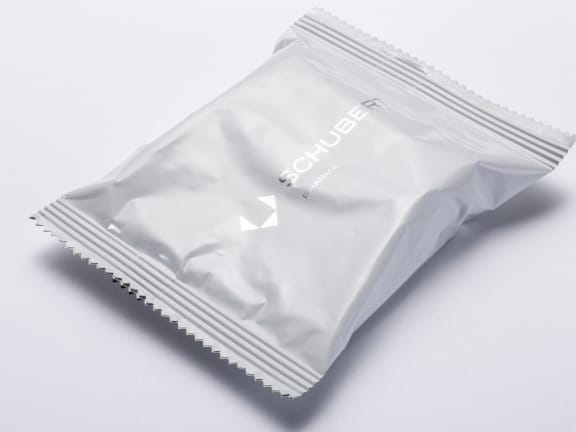



Trays
Baked goods vary in shape, size and texture, as do the trays in which they are packaged. Here too, protection against damage to the product and shelf life are paramount. Because they are used as primary packaging, it is recommended that they are designed to be as space-saving as possible and easy to insert into subsequent packaging. To make trays for baked goods packaging sustainable, many baked goods manufacturers opt for cardboard packaging. At Schubert, we strongly support the choice of sustainable packaging and have designed our pick & place machines so that they can easily handle both plastic and cardboard trays.Our sustainable packaging experts support manufacturers who have not yet opted for sustainable packaging when it comes to packaging their baked goods in a more environmentally friendly alternative, such as cardboard.



Optimising baked goods packaging
Many manufacturers already use cardboard packaging for their baked goods, but would like to be even more environmentally friendly. The good news is that, over and above selecting the most sustainable packaging material for the product in question, there are further options for making bakery packaging more sustainable.
Important factors include the cut, material thickness and machinability. For example, a general revision of the formats, smaller cuts of the bakery packaging or thinner trays ensure that less material is used overall. Our packaging development experts will take a close look at your packaging together with you and identify potential improvements for greater environmental friendliness.
However, for many baked goods manufacturers, environmental friendliness is only one of the important features of packaging. This is why we also look at other factors, such as the appeal of the packaging at POS or availability of the required packaging material on the market, in order to find the right solution for you and your specific formats.





Efficient processes from A to Z
It’s a long journey from the individual ingredients to the dough and all the way to the packaged baked bread. Well-designed packaging processes are a key factor when it comes to cost-effectiveness. Moreover, the smoother the processes can run, the fewer baked goods have to be rejected during the packaging process. It is also important in the baked goods industry to reduce waste and achieve greater sustainability.
We have set ourselves ambitious goals when it comes to avoiding waste, and we support baked goods manufacturers in reducing their waste to as close to zero as possible. We can ensure this with a reliable packaging process and gentle handling of the fragile baked goods. We will also adapt our modular Schubert lines flexibly to your new parameters in the event of product modifications or launches. Thinking outside the box is also essential. We include upstream and downstream production and packaging steps in our planning. And if you would like to think even further ahead with us, the experienced teams from Schubert-Consulting will also analyse the entire supply chain – from raw materials all the way through to recycling.
A focus on sustainability upstream and downstream of the machine
Anyone who opts for sustainable baked goods packaging should also look at the associated processes. For example, a machine concept with a capacity buffer helps prevent overproduction of baked goods. Optimising or reducing the packaging layout can lead to less space being required during transport and thereby reduce CO2 emissions. In order to capitalise on this untapped potential, we recommend involving our Schubert experts in a new project as early as possible. You’ll benefit from even greater opportunities to establish sustainability along the entire process chain.
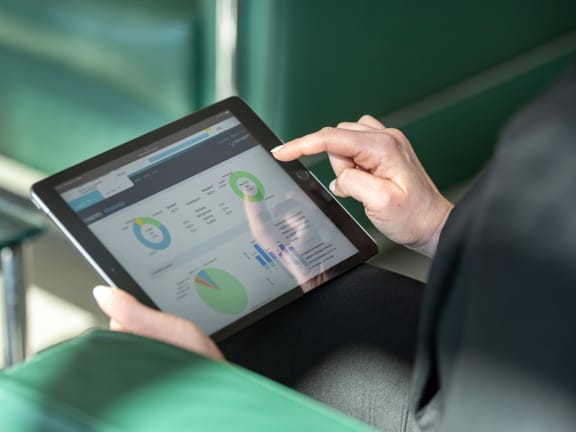

Practical examples of sustainability in the bakery products sector
Flexibility and high precision are at the heart of our innovative packaging machines. These basic requirements are the foundation on which environmentally friendly packaging for bakery products can be achieved. Take a look at how some of our customers have integrated more sustainability into their packaging processes.


